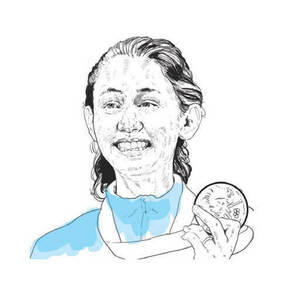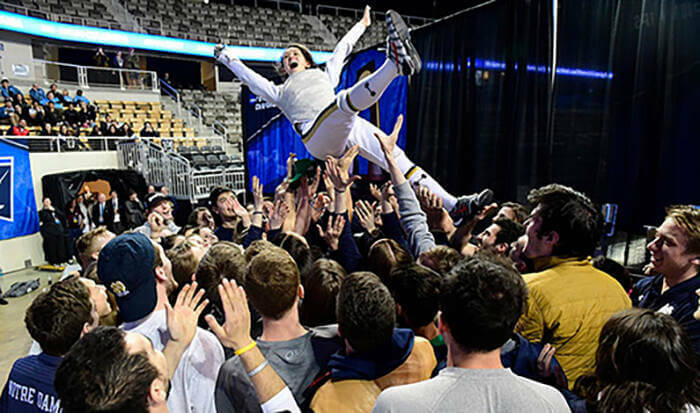
Notre Dame fencing coach Gia Kvaratskhelia swore he lost 10 years off his life while Lee Kiefer ’17 fenced in the women’s Olympic foil final in Tokyo.
He couldn’t see the match live, just the score as it was updated. Kiefer and her opponent, Inna Deriglazova of Russia, were close the entire time, though Kiefer never trailed.
“Lee is the ultimate competitor,” Kvaratskhelia says. “Given the opportunity, she clings to every chance to succeed. She makes the impossible possible. I couldn’t believe it, our kid came here at age 18, graduated five years later, standing on top of Mount Olympus with the gold medal. Every time I see those videos, I have tears in my eyes.”
The video of her winning — viewed more than 2.7 million times on NBC Sports’ YouTube account — is an emotional one. Kiefer scores her 15th touch and explodes, ripping off her helmet and screaming “Oh my God!” to an eerily empty arena. Her coach, Amgad Khazbak, is muffled by a mask, but a careful listener can hear him say, “I told you, you were the best!”
But Kiefer views her win through the lens of what it means for the team.
“The feelings run so deep,” she says by phone from Kentucky, her native state. “The foil team — we’ve grown up with each other. We’ve been building this program, specifically together, for the last 10 years. We started getting no results together as high schoolers, and then we won the women’s foil team worlds together in 2018. That was also when the men’s foil team was ranked No. 1 — we work so closely together. I feel so honored to contribute to the foil history we’ve been building together.”
Kiefer has had quite the series of successes since graduating from Notre Dame in 2017. In addition to taking on the world (and winning) in Tokyo, she started medical school alongside her husband, former Notre Dame men’s foil star Gerek Meinhardt ’13, ’15 MBA. (Meinhardt earned a team bronze medal in foil at the Rio de Janeiro and Tokyo Olympic Games.)
Continuing to fence after college wasn’t always an absolute for Kiefer. After her disappointing showing at the 2016 Olympics in Rio, she was devastated. She returned to Notre Dame for her senior year with a laser focus on collegiate fencing.
“We hadn’t won a team championship since I had been at Notre Dame, and I wanted to do it for the team — to do that I needed to stay fresh, so I just focused on team fencing,” she says.
A week before the team went to the championship, she was ranked No. 1 in the world. After the Fighting Irish won the championship, there were finals and graduation. With medical school on the horizon, she wasn’t sure she could balance everything.

“I definitely felt like I had more to give in fencing, but I just didn’t know if it was possible with med school,” she says. “I talked to people at the University of Kentucky, parents, my husband — then my boyfriend — and everyone was supportive. Everyone thought I should at least try.”
She made it work, continuing to fence with her sights set on the 2020 Tokyo Olympics. Her fencing home, the Bluegrass Fencers Club, and her coach made things as easy as they could be while balancing medical school and training.
“When you’re an undergrad, fencing was part of my job, in a sense. I was part of a team. Academics and athletics work very closely together,” Kiefer says. “But when you go to med school, you’re expected to be a full-time student for a good reason, because the course load is very demanding and builds on itself. It was really hard. I definitely spread myself thinner than I have ever done before.”
To make things harder, COVID-19 threw a wrench into everyone’s gears.
“We were at our last qualification tournament when the world started shutting down,” Kiefer says. “We did not fence for probably two months, probably the longest I had gone since I started fencing at 7 years old. We just didn’t know — if everyone’s going to be sick, fencing didn’t really matter.”
She, along with Meinhardt, her brother Axel Kiefer ’19, his girlfriend and one of Lee’s best friends, Samantha Viqueira ’20, built a practice strip in her parents’ basement. They fenced with each other nearly exclusively for six months.
The extra time wasn’t necessarily a bad thing, she says. Pushing the Olympics back a year gave her the opportunity to fine-tune areas of her competition that needed polishing.
And, even though the Olympics are an understandably stressful affair, that didn’t stop Kiefer from having, in her words, a “stinking good time.” She laughs — her third trip to the Olympics was fun, more than anything. That included swapping pins with other Olympians, taking pictures with the rings in the Olympic Village, trying lots of foods in the dining hall — as well as coming home with the gold.
Shortly after returning from the Olympics, though, Kiefer and the larger Notre Dame fencing family unexpectedly lost Buckie Leach, a fencing titan who, in Kvaratskhelia’s words, “was a trailblazer for women’s fencing in the U.S.”
“He was at the beginning of women’s foil in this country. He was a four-time Olympic team coach,” Kvaratskhelia says. “His coming to Notre Dame was really unexpected for everyone. But he saw the potential that he could enhance women’s foil at Notre Dame while at the same time the national women’s team coach. We were lucky to have him. We had three national championship runs in the five years he was here. It’s not a coincidence.”
Leach died August 14 in a motorcycle accident in Pennsylvania. He was known to many not just for his fencing and coaching skills, but his warmth and friendship. Kvaratskhelia says Leach’s biggest influence came off the strip, as a mentor and father figure to many at Notre Dame and the U.S. fencing teams. Kiefer agrees.
“I just wanted to say thank you to him. I can’t talk about fencing without giving him the credit or love he deserves,” Kiefer says, sadness palpable in her voice. “We worked so closely together, this past year specifically. He made fencing really fun, and he made me better as a person, too. He’s touched so many people’s lives like that. I just want to say thank you.”
Fencing fans are thankful that Kiefer’s career is not over. She and Meinhardt announced in October that they’ll continue competing in preparation for the 2024 Paris Olympics.
As Kiefer put it on Twitter, “Grandma and grandpa aren’t ready to give up fencing quite yet.”
Amanda Gray is the digital editor for Notre Dame Law School. Previously bylines include The South Bend Tribune and The Goshen News. Follow her on Twitter @TheAmandaGray.